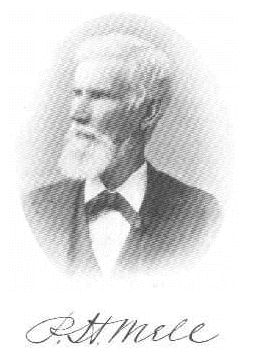 This month one of the leading Baptists of the South forms a Confederate company in Athens, Georgia:
This month one of the leading Baptists of the South forms a Confederate company in Athens, Georgia:
The Mell Rifles, Co. D, Cobb’s Legion Infantry, was raised in Athens, GA, in July 1861, by Patrick Hues Mell, Baptist Minister and Vice Chancellor of the University of Georgia. After Mell resigned due to his wife’s death, Thomas U. Camak was named commander. John Boswell Cobb, Robert Goodman and W. A. Winn were named lieutenants. Noncomissioned officers were J.F. Wilson, Wm. A. Gilleland, S. P. Kenney, G. W. Barber, J. J. Mattox, and L. H. Horne. The unit fought throughout the war until two days before Appomattox, when it was surrounded and captured.
Sgt. Benjamin Mell, son of Patrick, was seriously wounded, Thomas S. Lee, a local Southern sympathizer, nursed Mell at his home, “Needwood Forest,: near Petersville. Mell died there on Oct. 21, 1862, and was buried in St. Mark’s Epsicopal Churchyard, Petersville, his grave marked by a handsome monument.
In addition to being a professor at Georgia Baptist’s Mercer University prior to the war and a University of Georgia adminstrator during the war, Mell is president of the Georgia Baptist Convention and a future president of the Southern Baptist Convention (a position he obtains in 1863, thereafter becoming the longest-serving president in Southern Baptist Convention history). He yet holds the presidency of both organizations upon his death in 1888. A new generation of Southern Baptist Calvinists in the late 20th and early 21st centuries would uphold Mell as an ideal Calvinist holding to exemplary theology.
Committed to the righteousness of African slavery, in 1844 Mell had published a 40-page booklet entitled Slavery. A Treatise Showing that Slavery is Neither a Moral, Political, Nor Social Evil. The booklet was a compilation of articles that Mell had written for Georgia Baptists’ Christian Index on the eve of the formation of the Southern Baptist Convention, a denomination founded upon a commitment to the perpetuation of African slavery.
Mell’s defense of slavery extends to his service in the Confederate Army, while his commitment to the “Old South” frames his post-war career as an educator.
Sources: Patrick H. Mell, Slavery. A Treatise Showing that Slavery is Neither a Moral, Political Nor Social Ill (Penfield, GA: Benj. Brantly, 1844) (link); P. H. Mell Jr., Life of Patrick Hues Mell (Louisville, KY: Robert Rowell, 1895) (link); “Mell Rifles and Troup Light Artillery” (link); “Patrick H. Mell” (link);


